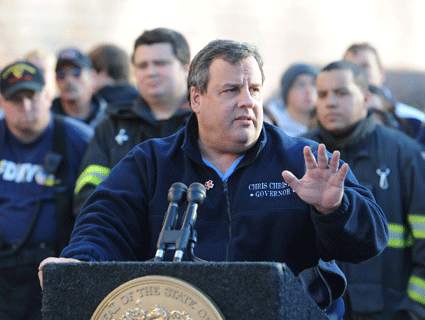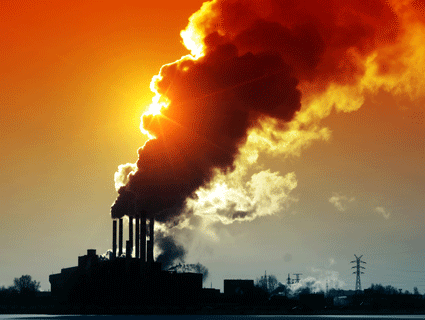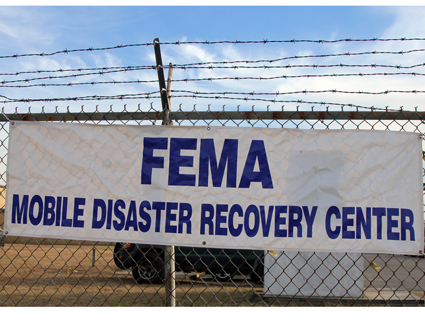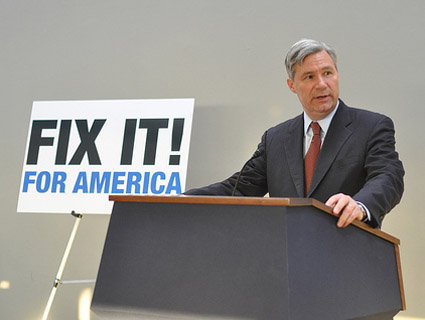
Clem Murray/Philadelphia Inquirer/ZUMAPress
Chris Christie, the combative Republican governor of New Jersey, thinks that climate change is a problem and humans are causing it. “Climate change is real…[and] impacting our state,” he said in August 2011. “Human activity plays a role in these changes.” Christie hasn’t shown much willingness to act on the issue: In the same speech, he announced he was pulling New Jersey out of a Northeastern regional plan to cut carbon emissions. But in simply acknowledging that climate change is not some liberal conspiracy, Christie is standing out from the GOP pack. He’s a popular Republican with national ambitions who seems to recognize the threat. That’s raised a question among some hopeful activists: Can Chris Christie shift the politics of climate change?
If Christie decided to lead on climate, he wouldn’t be the first New Jersey Republican to do so. Tom Kean Sr., the Republican governor of New Jersey from 1982 to 1990, was one of the first politicians to pay attention to climate change as a threat. In 1989, Kean issued an executive order noting the scientific consensus on that greenhouse gas emissions were warming the planet, and directing state agencies to start figuring out how to deal with that. Although Kean is a Christie fan, he’s also criticized him not doing more on climate. “We’ve got some climate change policies in the state,” Kean says. “He’s accepted those. I can’t say he’s been leader on them. He hasn’t been.” But that could change, Kean adds.
“The thing people love about this guy is he says what’s on his mind. He’s said a lot of things that aren’t politic…I think if he believes in something he’s going to talk about it,” Kean says. “He could be a real leader on this if he wants to be. I hope he is.”
Nationally, Republicans who care about climate change are looking for a leader. “With a majority of Americans already expressing concern about climate change and most others trying to make sense of destructive and unprecedented weather, voters of all political stripes will be looking for leaders willing to tackle the problem and offer real solutions,” says Rob Sisson, president of ConservAmerica, a right-leaning environmental group. “There is no political future in the climate denial game, and I hope my fellow Republicans can now see the political pitfalls of being bullied by the most radical and irresponsible voices in our party.”
Environmentalists in New Jersey aren’t sure what Christie really thinks about the issue. In the 2009 election, the New Jersey Environmental Federation (NJEF) surprised many in the state by endorsing Christie over incumbent Democrat Jon Corzine—the group’s first endorsement of a Republican for statewide office in almost three decades. The group knocked Corzine’s failure to live up to environmental promises, and cited Christie’s “impressive green agenda.”
But Christie’s promises faded soon after taking office—and climate hawks have been disappointed that he didn’t talk more about the link between climate change and more powerful storms such as Hurricane Sandy, which pummeled New Jersey. Asked about climate change’s role in the storm earlier this month, Christie dismissed it. “It’s not a main concern for me,” he said. “Now maybe, in the subsequent months and years, after I get done with trying to rebuild the state and put people back in their homes, I will have the opportunity to ponder the esoteric question of the cause of this storm.” New York’s Democratic Gov. Andrew Cuomo has spoken of the need to rebuild smarter—and not in all the same places. But Christie has put his emphasis on restoring the shore that once was.
“It was our hope that he would change the dialogue,” says Amy Goldsmith, director of NJEF. “But clearly his post-Sandy remarks don’t show that desire. In fact he’s pooh-poohing it as if it’s an academic, wacko thing to talk about.” In its last report card on legislators, NJEF gave Christie an F.
It’s not just a rhetorical slight; as governor, Christie has gutted many programs that aimed to address climate change. He got rid of the Office of Climate Change and Energy within the Department of Environmental Protection shortly after taking office, withdrew the state from the Northeast’s cap and trade plan known as the Regional Greenhouse Gas Initiative (RGGI), weakened the state’s renewable energy standard, and took $210 million from the state’s clean energy fund to balance the budget.
Jeff Tittel, the head of the New Jersey chapter of Sierra Club, says that Christie has tried to have it both ways by talking a good game on climate but enacting policies that actually make the problem worse. “People in New Jersey believe in climate change, so he’s parsed his words very, very carefully,” Tittel says. “He can give impression in New Jersey that he cares about the issue, but on national stage he pulls out of RGGI. It’s an interesting tightrope walk.”
As Tittel notes, the New Jersey GOP is generally moderate on climate change. When Congress voted on a cap and trade bill in 2009, three of the eight Republicans voting in favor were from the Garden State. But getting elected in New Jersey is different than surviving a Republican presidential primary, and it’s long been clear that Christie has national ambitions. And although the Republican Party has deemed climate a non-issue, voters care about it nationally. Polling ahead of last fall’s election showed that the vast majority of voters wanted a “green” candidate who would take action on climate change, and Americans did, indeed, pick the presidential candidate who acknowledged the problem. Christie’s popularity affords him more leeway to experiment than many other Republican politicians.
“If Gov. Christie can find ways to come up with his own approach to dealing with these things and reach across the aisle, cooperate with Democrats, I think that can be an example going forward,” says Ben Spinelli, the Republican former mayor of Chester, New Jersey, and the former head of the state’s Office of Smart Growth under Corzine.
“He’s in a fairly strong political position, so he can take risks that someone else might not be willing or able to take,” Spinelli says. “The question is, will he be willing to do it? I don’t know.”
















